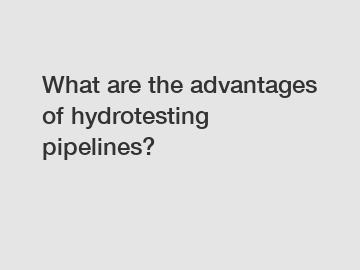What are the advantages of hydrotesting pipelines?
Advantages of Hydrotesting Pipelines.
Hydrotesting pipelines is a widely used method in the oil and gas industry to ensure the quality and reliability of pipelines. It involves pressurizing pipelines with water to detect any leaks or weaknesses before they are put into operation. This test is essential for pipeline integrity, and it offers several advantages. In this article, we will explore the advantages of hydrotesting pipelines in more detail.
1. Detecting Leaks:

One of the primary advantages of hydrotesting pipelines is the ability to detect leaks. By pressurizing the pipeline with water, any leaks or weak points become visible. This ensures that any potential leaks are identified and repaired before the pipeline is put into operation. Early detection of leaks is crucial for preventing environmental contamination and minimizing the risk of accidents.
2. Strength and Integrity Validation:
Hydrotesting also provides a means to validate the strength and integrity of pipelines. During the test, the pipeline is subjected to higher pressures than it would experience in normal operation. This allows engineers to determine if the pipeline can withstand the expected operating conditions. By ensuring the strength and integrity of the pipeline, the risk of failures and subsequent costly repairs can be minimized.
3. Compliance with Regulations:
Hydrotesting pipelines is often a regulatory requirement in many countries. The test helps companies comply with industry standards and government regulations that aim to ensure the safety and reliability of pipelines. By conducting hydrotests, companies can demonstrate their commitment to safety and fulfill legal obligations, avoiding potential penalties or legal consequences.
4. Enhanced Safety:
The safety of pipeline installations is of paramount importance. Hydrotesting plays a critical role in enhancing safety by identifying and rectifying any potential weaknesses or vulnerabilities. By conducting this test, companies can reduce the risk of accidents, explosions, and leakages, thus protecting employees, the environment, and nearby communities.
5. Cost Savings:
While hydrotesting pipelines requires an initial investment, it can lead to long-term cost savings. By identifying and repairing any leaks or weaknesses before the pipeline is operational, companies can avoid costly repairs and potential legal liabilities. Addressing issues early also extends the lifespan of the pipeline, reducing the need for frequent maintenance and replacement, ultimately saving money in the long run.
6. Increased Reliability:
Hydrotesting provides peace of mind by ensuring the reliability of pipelines. By conducting this test, pipeline operators can have confidence in the performance of their infrastructure. A reliable pipeline system is vital for the transportation of oil, gas, or chemicals, as it ensures a smooth and uninterrupted flow. The increased reliability of pipelines also minimizes downtime, which is crucial for continuous operations and the meeting of production targets.
In conclusion, hydrotesting pipelines offer numerous advantages that contribute to the overall safety, reliability, and compliance of pipeline systems. By detecting leaks, validating integrity, complying with regulations, enhancing safety, saving costs, and increasing reliability, hydrotesting plays a pivotal role in the oil and gas industry. Companies should prioritize the implementation of regular hydrotests to prevent accidents, protect the environment, and maintain the seamless operation of their pipeline networks.
If you need assistance or have any questions regarding hydrotesting pipelines, please do not hesitate to contact us. Our team of experts is committed to providing reliable and efficient solutions for ensuring the integrity and safety of your pipelines.
Want more information on Electric Heat Tracing Design, Sub-sea Pipeline Testing, China Pipeline Process Services Provider? Feel free to contact us.
206
0
0

Comments
All Comments (0)